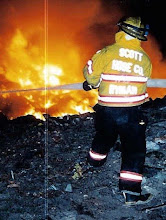Always what? Well it’s not
always great, or in some cases, actually new.
Recycling
old ideas or techniques with new names and calling it progress has been part of
the culture for a long time.
So what is a new fire officer (or any fire officer for that matter) to
do? How about this for a radical
idea—think.
Think for yourself. Don’t
blindly accept either the status quo or the latest greatest. Examine both with a high degree of
rigor. I’m not suggesting blatant
disregard of standard operating procedures, whether existing or new, but
there’s nothing wrong with looking at them critically.
Challenge yourself. Specifically
select articles, blogs, and authors to read with whom you inherently disagree,
and then try to read them with an open mind. Evaluate their arguments dispassionately. Look behind the data. How was it developed? Was the methodology valid or do you perceive
flaws?
They may not change your mind, but you will better understand the
arguments others are making on a particular topic. Reading in this way also opens you up to the
possibility that in some cases, you might need to acknowledge your own
pre-conceived notions may not be correct.
Try to find a few fellow officers, peers and superiors, with whom you
can have a wide ranging, non-judgmental dialogue on fire service issues. A few adult beverages (the operative word
being few) can sometimes help lubricate these discussions. The response “that’s #($*& stupid and so
are you,” is not the type of conversation you are shooting for. An open and respectful debate can sharpen
thought processes, expose unanticipated flaws in policies and procedures, and
overall, be valuable for all participants.
I would be remiss if I didn’t point out; all of this is easier said
than done. Comfort zones are called that
for a reason. They’re nice enjoyable
places to stay where you don’t have to think.
Critical thinking in this manner is one of the most important tools of
the fire officer and leader. Get out of
your comfort zone and try it.



